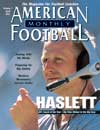AMERICAN FOOTBALL MONTHLY THE #1 RESOURCE FOR FOOTBALL COACHES
Article CategoriesAFM Magazine
|
What Reporters Really Wantby: Richard Scott© More from this issue I have a soft spot for football coaches. I respect them. I admire them. I still look at my favorite coaches with true appreciation for their time, commitment, energy, intensity and passion for the game, and the life lessons that came with being part of it. I empathize with the challenges they face, the hours they work, the fragile nature of their job security and the expectations they face from outsiders who understand very little about what they do. And I am a member of the media. Sounds strange, huh? How can somebody respect you, yet still be out to get you? How can someone be your friend, and still be your enemy? Maybe we're not out to get you. Maybe we're not the enemy. Maybe you were wrong about us all along. OK, before everyone gets mad and turns the page, give me a few minutes of your time. Improving your working....The full article can only be seen by subscribers.
|
|
|||||||
| HOME |
MAGAZINE |
SUBSCRIBE | ONLINE COLUMNISTS | COACHING VIDEOS |
Copyright 2026, AmericanFootballMonthly.com
All Rights Reserved





